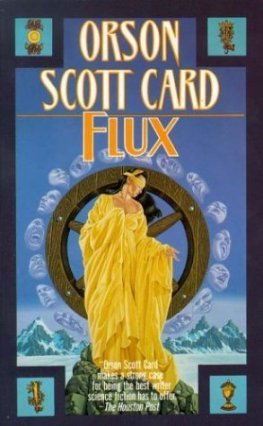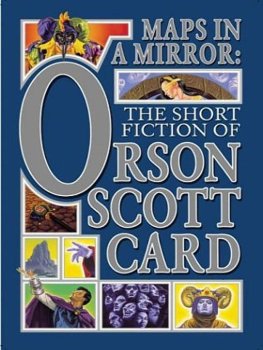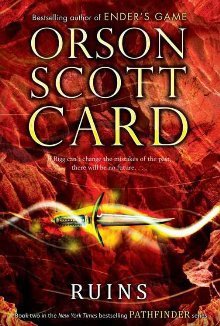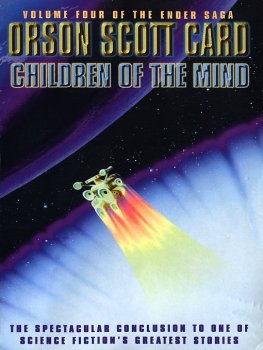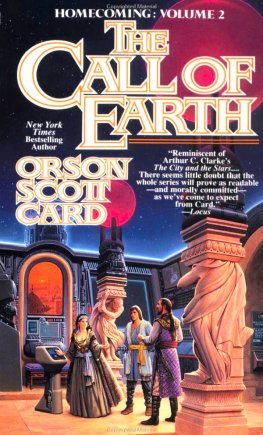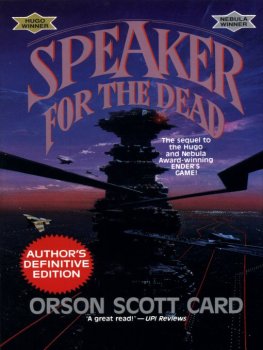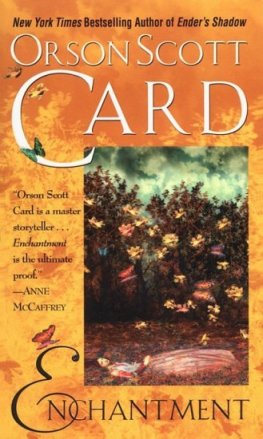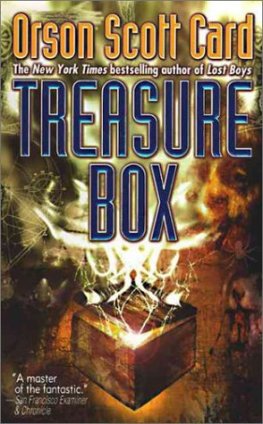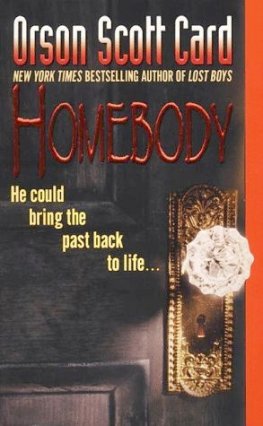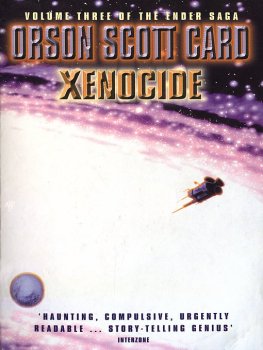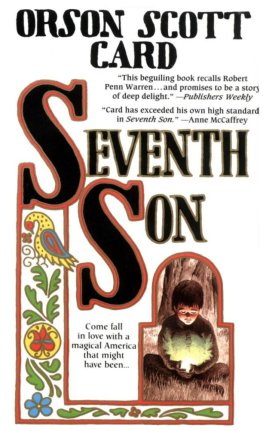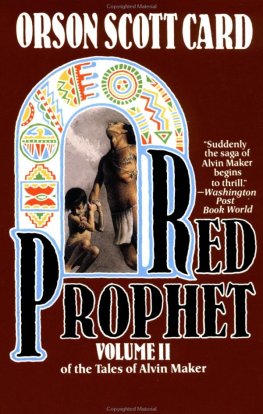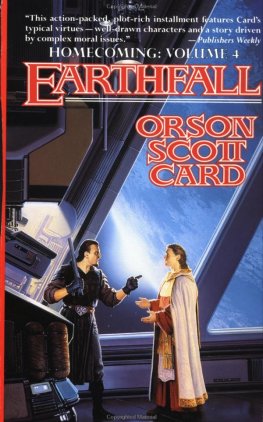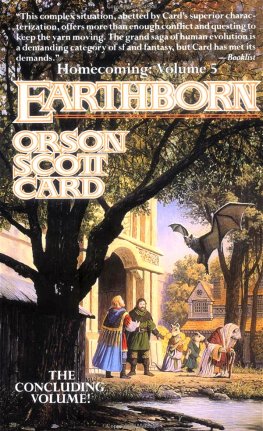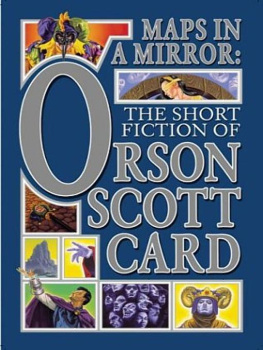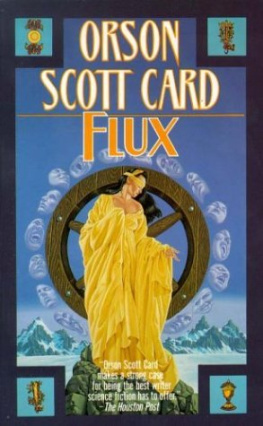Orson Card - 27 Short Stories
Here you can read online Orson Card - 27 Short Stories full text of the book (entire story) in english for free. Download pdf and epub, get meaning, cover and reviews about this ebook. genre: Science fiction. Description of the work, (preface) as well as reviews are available. Best literature library LitArk.com created for fans of good reading and offers a wide selection of genres:
Romance novel
Science fiction
Adventure
Detective
Science
History
Home and family
Prose
Art
Politics
Computer
Non-fiction
Religion
Business
Children
Humor
Choose a favorite category and find really read worthwhile books. Enjoy immersion in the world of imagination, feel the emotions of the characters or learn something new for yourself, make an fascinating discovery.

- Book:27 Short Stories
- Author:
- Genre:
- Rating:3 / 5
- Favourites:Add to favourites
- Your mark:
- 60
- 1
- 2
- 3
- 4
- 5
27 Short Stories: summary, description and annotation
We offer to read an annotation, description, summary or preface (depends on what the author of the book "27 Short Stories" wrote himself). If you haven't found the necessary information about the book — write in the comments, we will try to find it.
27 Short Stories — read online for free the complete book (whole text) full work
Below is the text of the book, divided by pages. System saving the place of the last page read, allows you to conveniently read the book "27 Short Stories" online for free, without having to search again every time where you left off. Put a bookmark, and you can go to the page where you finished reading at any time.
Font size:
Interval:
Bookmark:
Orson Scott Card
27 Short Stories
A SEPULCHRE OF SONGS
She was losing her mind during the rain. For four weeks it came down nearly every day, and the people at the Millard County Rest Home didn't take any of the patients outside. It bothered them all, of course, and made life especially hellish for the nurses, everyone complaining to them constantly and demanding to be entertained.
Elaine didn't demand entertainment, however. She never seemed to demand much of anything. But the rain hurt her worse than anyone. Perhaps because she was only fifteen, the only child in an institution devoted to adult misery. More likely because she depended more than most on the hours spent outside; certainly she took more pleasure from them. They would lift her into her chair, prop her up with pillows so her body would stay straight, and then race down the corridor to the glass doors, Elaine calling, "Faster, faster," as they pushed her until finally they were outside. They told me she never really said anything out there, just sat quietly in her chair on the lawn, watching everything. And then later in the day they would wheel her back in.
I often saw her being wheeled in -- early, because I was there, though she never complained about my visits' cutting into her hours outside. As I watched her being pushed toward the rest home, she would smile at me so exuberantly that my mind invented arms for her, waving madly to match her childishly delighted face; I imagined legs pumping, imagined her running across the grass, breasting the air like great waves. But there were the pillows where arms should be, keeping her from falling to the side, and the belt around her middle kept her from pitching forward, since she had no legs to balance with.
It rained four weeks, and I nearly lost her.
My job was one of the worst in the state, touring six rest homes in as many counties, visiting each of them every week. I "did therapy" wherever the rest home administrators thought therapy was needed. I never figured, out how they decided -- all the patients were mad to one degree or another, most with the helpless insanity of age, the rest with the anguish of the invalid and the crippled.
You don't end up as a state-employed therapist if you had much ability in college. I sometimes pretend that I didn't distinguish myself in graduate school because I marched to a different dnunmer. But I didn't. As one kind professor gently and brutally told me, I wasn't cut out for science. But I was sure I was cut out for the art of therapy. Ever since I comforted my mother during her final year of cancer, I had believed I had a knack for helping people get straight in their minds. I was everybody's confidant.
Somehow I had never supposed, though, that I would end up trying to help the hopeless in a part of the state where even the healthy didn't have much to live for. Yet that's all I had the credentials for, and when I (so maturely) told myself I was over the initial disappointment, I made the best of it.
Elaine was the best of it.
"Raining raining raining," was the greeting I got when I visited her on the third day of the wet spell.
"Don't I know it?" I said. "My hair's soaking wet."
"Wish mine was," Elaine answered.
"No, you don't. You'd get sick."
"Not me," she said.
"Well, Mr. Woodbury told me you're depressed. I'm supposed to make you happy."
"Make it stop raining."
"Do I look like God?"
"I thought maybe you were in disguise. I'm in disguise," she said. It was one of our regular games. "I'm really a large Texas armadillo who was granted one wish. I wished to be a human being. But there wasn't enough of the armadillo to make a full human being; so here I am." She smiled. I smiled back.
Actually, she had been five years old when an oil truck exploded right in front of her parents' car, killing both of them and blowing her arms and legs right off. That she survived was a miracle. That she had to keep on living was unimaginable cruelty. That she managed to be a reasonably happy person, a favorite of the nurses -- that I don't understand in the least. Maybe it was because she had nothing else to do. There aren't many ways that a person with no arms or legs can kill herself.
"I want to go outside," she said, turning her head away from me to look out the window.
Outside wasn't much. A few trees, a lawn, and beyond that a fence, not to keep the inmates in but to keep out the seamier residents of a rather seamy town. But there were low hills in the distance, and the birds usually seemed cheerful. Now, of course, the rain had driven both birds and hills into hiding. There was no wind, and so the trees didn't even sway. The rain just came straight down.
"Outer space is like the rain," she said. "It sounds like that out there, just a low drizzling sound in the background of everything."
"Not really," I said. "There's no sound out there at all."
"How do you know?" she asked.
"There's no air. Can't be any sound without air."
She looked at me scornfully. "Just as I thought. You don't really know. You've never been there, have you?"
"Are you trying to pick a flght?"
She started to answer, caught herself, and nodded. "Damned rain."
"At least you don't have to drive in it," I said. But her eyes got wistful, and I knew I had taken the banter too far. "Hey," I said. "First clear day I'll take you out driving."
"It's hormones," she said.
"What's hormones?"
"I'm fifteen. It always bothered me when I had to stay in. But I want to scream.
My muscles are all bunched up, my stomach is all tight, I want, to go outside and scream. It's hormones."
"What about your friends?" I asked.
"Are you kidding? They're all out there, playing in the rain."
"All of them?"
"Except Grunty, of course. He'd dissolve."
"And where's Grunty?"
"In the freezer, of course."
"Someday the nurses are going to mistake him for ice cream and serve him to the guests." She didn't smile. She just nodded, and I knew that I wasn't getting anywhere. She really was depressed.
I asked her whether she wanted something.
"No pills," she,said. "They make me sleep all the time."
"If I gave you uppers, it would make you climb the walls."
"Neat trick," she said.
"It's that strong. So do you want something to take your mind off the rain and these four ugly yellow walls?"
She shook her head. "I'm trying not to sleep."
"Why not?"
She just shook her head again. "Can't sleep. Can't let myself sleep too much."
I asked again.
"Because," she said, "I might not wake up." She said it rather sternly, and I knew I shouldn't ask anymore. She didn't often get impatient with me, but I knew this time I was coming perilously close to overstaying my welcome.
"Got to go," I said. "You will wake up." And then I left, and I didn't see her for a week, and to tell the truth I didn't think of her much that week, what with the rain and a suicide in Ford County that really got to me, since she was fairly young and had a lot to live for, in my opinion. She disagreed and won the argument the hard way.
Weekends I live in a trailer in Piedmont. I live alone. The place is spotlessly clean because cleaning is something I do religiously. Besides, I tell myself, I might want to bring a woman home with me one night. Some nights I even do, and some nights I even enjoy it, but I always get restless and irritable when they start trying to get me to change my work schedule, or take them along to the motels I live in or, once only, get the trailerpark manager to let them into my trailer when I'm gone. To keep things cozy for me. I'm not interested in "cozy." This is probably because of my mother's death; her cancer and my responsibilities as housekeeper for my father probably explain why I am a neat housekeeper. Therapist, therap thyself. The days passed in rain and highways and depressing people depressed out of their minds; the nights passed in television and sandwiches and motel bedsheets at state expense; and then it was time to go to the Millard County Rest Home again, where Elaine was waiting. It was then that I thought of her and realized that the rain had been going on for more than a week, and the poor girl must be almost out of her mind. I bought a cassette of Copland conducting Copland. She insisted on cassettes, because they stopped. Eight-tracks went on and on until she couldn't think.
Font size:
Interval:
Bookmark:
Similar books «27 Short Stories»
Look at similar books to 27 Short Stories. We have selected literature similar in name and meaning in the hope of providing readers with more options to find new, interesting, not yet read works.
Discussion, reviews of the book 27 Short Stories and just readers' own opinions. Leave your comments, write what you think about the work, its meaning or the main characters. Specify what exactly you liked and what you didn't like, and why you think so.

